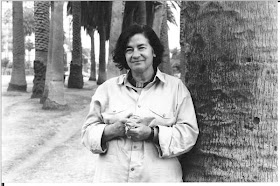Tuesday, March 5, 2013
City of Angels
Mr. Enrico had two pieces of mail for me. The first was a postcard from a young lawyer in Leipzig. He wrote: "Unlike you, I always hated the GDR and was thus immune to many things. You, however, were an important part of the GDR, and I hate you."
– from City of Angels (or, The Overcoat of Dr. Freud) by Christa Wolf, translated by Damion Searls
The book came out in German in 2010. Christa Wolf died at age 82 in 2011. Now in 2013 her final work is published in English by Farrar, Straus and Giroux. Wolf actually began the book during the time she describes in it – a nine-month invited fellowship in 1992-93 at the Getty Center in L.A. "At the time," as she writes, "it was housed in an ordinary, multistory office building, which has long since been replaced by a spectacular postsmodern complex high above the city."
She continued to work for the next two decades at the obsessive project this manuscript became for her. That spell in Southern California coincided with worldwide press coverage of the revelation that Wolf had worked from 1959 to 1961 as a Stasi informant, accepting a code name and speaking with "controllers" about fellow writers. Eventually the general outrage expressed over this news would calm down, as people realized that the Stasi had quickly given up on Wolf as an agent because of her "reticence" – and had subsequently spent 30 years in aggressive surveillance of the author and her family.
Yet the postcard from the young lawyer in Leipzig was not the senseless insult of a crank. He was hitting out at the single East German figure with the greatest international cultural prestige, someone who remained in East Germany by choice, refusing to surrender the ideal that Communism might still lead to a more just and equitable society than those she saw in the ruthless west. Her productive, impressive presence did in fact lend stature and respectability to an East Germany that virtually every other eminent artist had early-on deserted in disgust. Wolf believed that without this stubborn, irrational loyalty she could never have found her voice as a writer at all. The novel that concludes her career turns out mainly to be about the emotional price exacted by that allegiance – and only superficially (or metaphorically) about Southern California.



